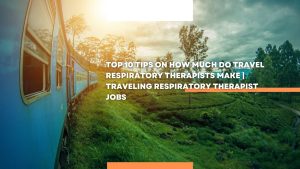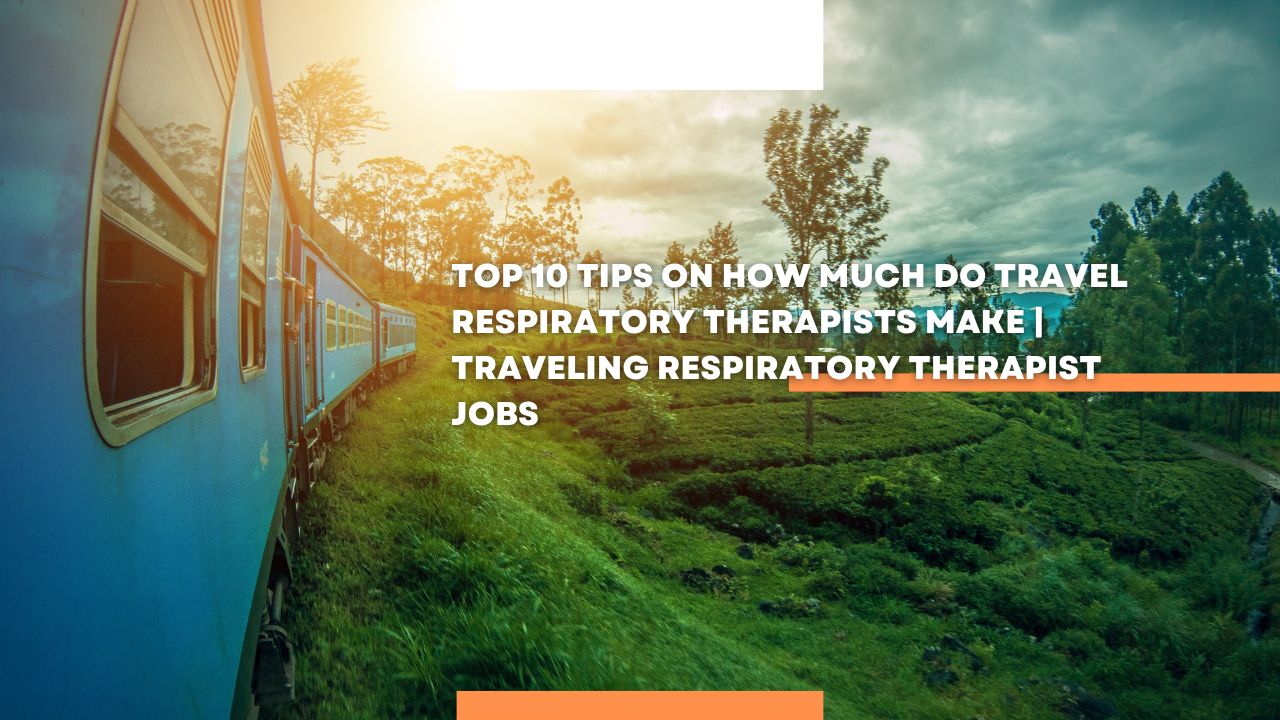Contents
- 0.1 How much do travel respiratory therapists make
- 0.1.1 Top 10 Tips on How much do travel respiratory therapists make
- 0.1.2 Introduction
- 0.1.3 1. Understand the Average Salary Range
- 0.1.4 2. Consider the Impact of Experience and Education
- 0.1.5 3. Examine the Role of Location and Facility
- 0.1.6 4. Evaluate the Benefits and Bonuses
- 0.1.7 5. Explore Different Work Contracts
- 0.1.8 6. Consider the Role of Travel and Housing Stipends
- 0.1.9 7. Analyze the Demand for Respiratory Therapists
- 0.1.10 8. Look into Additional Certifications and Specializations
- 0.1.11 9. Utilize Professional Resources and Networks
- 0.1.12 10. Research Agencies and Employers
- 0.1.13 FAQ
- 0.1.14
- 0.2 Traveling respiratory therapist jobs
- 0.3 Introduction
- 0.4 1. Understanding the Role of a Travel Respiratory Therapist
- 0.5 2. Factors Affecting Salary
- 0.6 3. Typical Compensation Packages
- 0.7 4. Impact of Contract Length
- 0.8 5. Demand and Job Market Trends
- 0.9 6. Cost of Living Adjustments
- 0.10 7. Comparing Travel vs. Permanent Positions
- 0.11 8. Negotiating Your Salary
- 0.12 9. Professional Growth and Development
- 0.13 10. Resources and Tools for Travel Respiratory Therapists
- 0.14 FAQ
- 0.14.1 how to become a respiratory therapist
- 0.14.2 how much does it cost to become a respiratory therapist
- 0.14.3 how long does it take to become a respiratory therapist
- 0.14.4 What factors should be considered when negotiating a salary?
- 0.14.5 Where can I find job opportunities for travel respiratory therapists?
- 0.15 Conclusion
- 1
Top 10 Tips on How much do travel respiratory therapists make | Traveling respiratory therapist jobs
How much do travel respiratory therapists make
Top 10 Tips on How much do travel respiratory therapists make
Introduction

Unique to their job, working in a variety of temporary offices improves their adaptability and ability to work anywhere. It is fundamental to fathom the procuring capability of movement respiratory specialists in the event that you are keen on seeking after a lifelong in this field or only inquisitive about its monetary viewpoints. In this article, we will take a gander at the best ten hints about how much travel respiratory experts make. These clues will show you clearly what their pay rates are, what factors affect it, and how you can help their benefit.
1. Understand the Average Salary Range
National Average Salary
Travel respiratory advisors by and large procure a cutthroat compensation, mirroring their particular abilities and the impermanent idea of their tasks. As per late information from the Department of Work Measurements (BLS) and different work market sources, the typical compensation for a movement respiratory specialist in the US regularly goes from $65,000 to $85,000 each year. This range can be affected by location, experience, and demand, among other things.
Regional Variations
The region can have a significant impact on salaries. Travel respiratory therapists, for instance, may earn more than those working in less expensive or rural areas in metropolitan areas or regions with high living costs, such as California or New York. The following variations are shown in Table 1:
Table 1: Average Annual Salary of Travel Respiratory Therapists by Region
| Region | Average Salary |
|---|---|
| Northeast | $70,000 – $90,000 |
| Midwest | $65,000 – $85,000 |
| South | $60,000 – $80,000 |
| West | $75,000 – $95,000 |
Sources: Bureau of Labor Statistics, Travel Healthcare Agencies
2. Consider the Impact of Experience and Education
Experience Level
How much experience an individual has is a major calculate how much cash they make. Travel respiratory therapists typically earn less than their more experienced counterparts. Most of the time, people with five to ten years of experience earn more, often reaching the top of the salary range. Specialists with more experience bring more specific skills and a deeper understanding of various medical conditions, which can result in higher compensation.
Educational Background
Procuring potential is likewise impacted by instructive capabilities. Respiratory therapists with advanced certifications or additional specializations, such as pediatric or neonatal care, may be eligible for higher pay. More significant compensations and further developed profession open doors can likewise result from extra schooling, like a single man’s or alternately graduate degree.
3. Examine the Role of Location and Facility
Facility Type
The salary of a travel respiratory therapist can be affected by the kind of healthcare facility in which they work. Clinics, for instance, frequently offer more significant salary contrasted with short term facilities or restoration focuses. Higher salaries may be offered by larger facilities with more complex cases in order to attract professionals with the necessary skills.
Location and Cost of Living
As previously stated, salary can be affected by where you live and how much it costs to live there. Travel respiratory therapists may be compensated for their higher living costs by receiving higher base pay and additional benefits in high-cost locations. On the other hand, salaries may be lower in areas with lower costs, but they are still competitive with local standards.
4. Evaluate the Benefits and Bonuses
Benefits Packages
In addition to their base pay, travel respiratory therapists frequently enjoy a variety of benefits. Health insurance, retirement plans, and paid time off are examples of these. The benefits packages offered by some travel positions can significantly boost overall compensation. When contemplating various job offers, it is essential to carefully examine these benefits.
Bonuses and Incentives
In addition, income can rise with incentives and rewards. Numerous travel medical care organizations offer reference rewards, marking rewards, and finish rewards. These motivating forces could fundamentally help a specialist’s yearly income.
5. Explore Different Work Contracts
Contract Negotiations
Negotiating contract terms is essential for maximizing earnings. In addition to discussing their hourly rate, therapists should also discuss housing stipends, travel reimbursement, and meal allowances. A successful negotiation can have a significant impact on the entire financial package.
6. Consider the Role of Travel and Housing Stipends
Travel Reimbursement
Travel reimbursement or stipends are common in travel respiratory therapist positions to help cover the cost of moving or commuting between assignments. Personal expenses can be covered by these stipends, which can also improve the financial picture as a whole
Housing Stipends
Stipends for housing are another common benefit. Travel specialists frequently get a lodging remittance or payment to take care of convenience costs while on task
7. Analyze the Demand for Respiratory Therapists
Current Job Market Trends
Salary levels can be influenced by the demand for respiratory therapists. In regions encountering a lack of medical care experts, travel respiratory specialists might order more significant compensations because of the expanded need. Respiratory therapists are in high demand across a variety of regions, as indicated by recent trends in the job market.
8. Look into Additional Certifications and Specializations
Advanced Certifications
A movement respiratory specialist’s procuring potential can be expanded by obtaining extra certificates, for example, those in cutting edge aviation route the board or pneumonic capability testing. The high demand for specialized skills may allow for higher pay to be justified.
Specialty Areas
Having some expertise in regions like neonatal or pediatric respiratory consideration can likewise prompt more significant compensations. To attract therapists with these specialized skills, facilities that require specialized care frequently offer competitive pay.
9. Utilize Professional Resources and Networks
Networking
For networking and information gathering, professional conferences, online forums, and social media groups are excellent venues.
10. Research Agencies and Employers
Top Travel Healthcare Agencies
The decision of movement medical care organization can influence compensation and advantages. Higher pay rates, better benefits, and more favorable contract terms are commonplace at some agencies. Investigating and looking at changed organizations can assist advisors with tracking down the best open doors.
Employer Reputation
Remuneration can likewise be affected by the business’ standing.
FAQ
What is the average salary for travel respiratory therapists?
Do travel respiratory therapists receive benefits?
Yes, travel respiratory therapists frequently get health insurance, paid time off, and retirement plans. Stipends and bonuses for housing and travel may also be available to them.
How can I increase my salary as a travel respiratory therapist?
Expanding your experience, getting progressed accreditations, zeroing in on specific fields, and effectively arranging contract terms are ways of helping your compensation. It can also be helpful to select assignments with high pay and reputable agencies.
What factors affect the salary of travel respiratory therapists?
Area, experience, the sort of medical care office, the interest for respiratory advisors, and the particulars of the agreement, similar to advantages and payments, all affect compensation.
Traveling respiratory therapist jobs
Top 10 Tips on How much do travel respiratory therapists make



2 thoughts on “Top 10 Tips on How much do travel respiratory therapists make | Traveling respiratory therapist jobs”